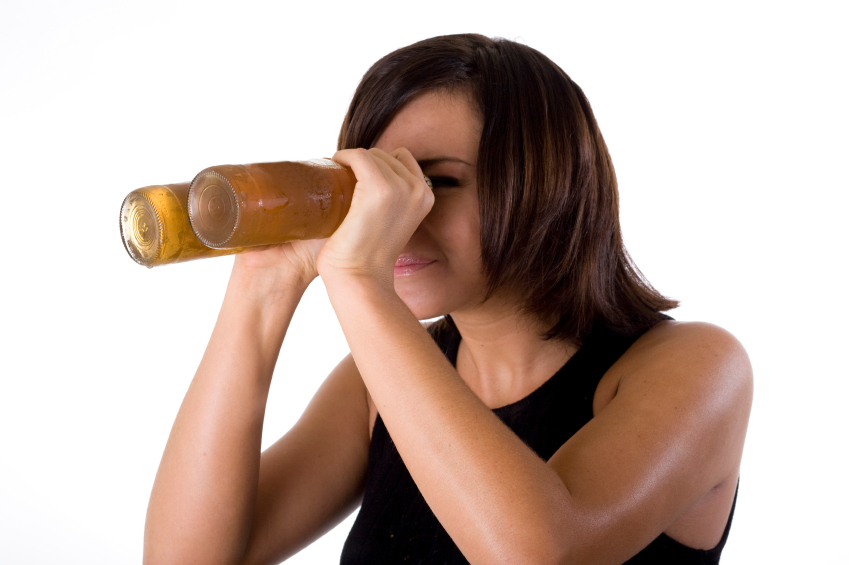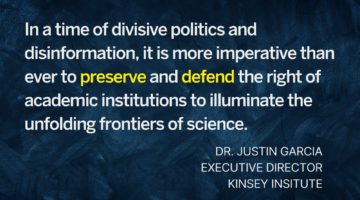The Science of “Beer Goggles”: Is Beauty In The Eye Of The Beer Holder?
April 7, 2014 by Justin Lehmiller
According to the Urban Dictionary, the term beer goggles is defined as the “phenomenon in which one’s consumption of alcohol makes physically unattractive persons appear beautiful.” In recent years, much has been said and written about beer goggles in the popular media (including the so-bad-it’s-good country song “Billy’s Got His Beer Goggles On”), but just how much truth is there to this idea? Does alcohol consumption really change our perceptions of attractiveness that much? Let’s see what the science has to say.
First, consider a 2011 study published in the Journal of Social Psychology in which 80 Australian college students were recruited from local bars and parties between the hours of 9:00 PM and midnight [1]. The sample was about evenly split between men and women, and all participants were heterosexual. All participants were given a breathalyzer test followed by a facial attractiveness survey. Specifically, participants were shown a series of 15 photos of members of the other sex selected from an online dating site. Participants rated the attractiveness of the person in each photo on a scale ranging from 1 (very unattractive) to 10 (very attractive).
The results revealed that blood alcohol content (BAC) and attractiveness ratings were positively correlated, meaning that as level of intoxication increased, so did perceived attractiveness—and this was true for both men and women. To give you a sense of the size of the effect, consider that among those participants with a BAC of 0, their average attractiveness rating was 3.3/10. In contrast, for the most intoxicated participants (those with a BAC of .10-.19%), their average rating was 4.5/10. Thus, alcohol was linked to a significant boost in ratings, but it didn’t seem to push everyone into the beautiful category, in contrast to what the Urban Dictionary definition for beer goggles suggests.
Alcohol isn’t just related to how we perceive the attractiveness of others, though. In fact, it also seems to change how we perceive our own attractiveness! In a 2013 paper published in the British Journal of Psychology, researchers surveyed men in French bars about how attractive, smart, and funny they thought they were [2]. Perhaps not surprisingly, the higher a man’s BAC, the more positively he rated himself on these attributes. In a follow-up lab experiment, however, these same researchers found that alcohol consumption didn’t matter as much as whether guys simply thought they were consuming alcohol. That’s right—when researchers gave men a non-alcoholic drink but led them to believe that it contained alcohol, those men experienced the same boost in their own attractiveness ratings as men who were actually given booze. This tells us that the effects of alcohol aren’t just physiological—they are at least partly a function of how we expect alcohol to affect us.
In short, beer goggles do seem to be a real thing, but the magnitude of the effect may not be as dramatic as you’ve been led to believe. Also, keep in mind that beer goggles don’t just affect how we see other people, they also affect how we see ourselves.
Want to learn more about Sex and Psychology? Click here for more from the blog or here to listen to the podcast. Follow Sex and Psychology on Facebook, Twitter (@JustinLehmiller), or Reddit to receive updates. You can also follow Dr. Lehmiller on YouTube and Instagram.
[1] Lyvers, M., Cholakians, E., Puorro, M., & Sundram, S. (2011). Beer goggles: Blood alcohol concentration in relation to attractiveness ratings for unfamiliar opposite sex faces in naturalistic settings. Journal of Social Psychology, 151, 105-112.
[2] Bègue, L., Bushman, B. J., Zerhouni, O., Subra, B., & Ourabah, M. (2013). ‘Beauty is in the eye of the beer holder’: People who think they are drunk also think they are attractive. British Journal of Psychology, 104, 225-234.
Image Source: iStockphoto
You Might Also Like:

Dr. Justin Lehmiller
Founder & Owner of Sex and PsychologyDr. Justin Lehmiller is a social psychologist and Research Fellow at The Kinsey Institute. He runs the Sex and Psychology blog and podcast and is author of the popular book Tell Me What You Want. Dr. Lehmiller is an award-winning educator, and a prolific researcher who has published more than 50 academic works.
Read full bio >


